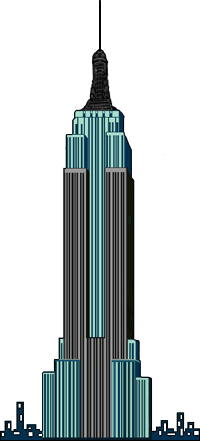Empire State Building, Manhattan, New York, USA
Created | Updated Nov 6, 2006

Despite having lost the record for being the tallest building in the world, upon completion of the first tower of the World Trade Center in Lower Manhattan in 1972, the 381-metre high 102-storey Empire State Building, situated between 33rd and 34th Streets on 350 Fifth Avenue, New York is probably the best-known and best-loved of all tall buildings, and earns its place (perhaps arguably) in a list of the World's Most Beautiful Buildings. A trip to New York will always be incomplete unless it involves a trip to the top.
Perhaps this is because, when it surpassed the Chrysler Building for height in 1931, the Empire State Building managed to put a cap on a tall building boom that began in 1885 with the construction in Chicago of the Home Insurance Building. The Empire State subsequently enjoyed the fruits of being the world's tallest building during the 20th Century boom of media, motion picture and Hollywood.
Somewhat cryptically, the building is named after New York, the Empire State being the state's nickname. Legend has it that when Henry Hudson sailed into what is now New York Harbor, he was so taken by the beauty and majesty of the area that he proclaimed 'This is the new Empire'.
Construction
Designed by architectural practice Shreve, Lamb and Harmon Associates, construction of the building superstructure began on the site of the old Waldorf-Astoria Hotel on 17 March, 1930. (Although excavation for the foundations had commenced on 22 January, 1930.) One of the enduring achievements of the Empire State Building was the speed of construction, which was completed only one year and 45 days later enabling the building to open on 1 May, 1931, when US President Herbert Hoover pressed a button in Washington DC to turn on the building's lights.
It is said that every cloud has a silver lining, and it is quite certain that the remarkable Starrett Brothers (general contractors for the building's construction) were the silver lining on the cloud of the 1930 stock market crash on Wall Street. Refusing to be bowed by a gripping recession, Starrett Brothers and Eken, Inc, premier 'skyline builders' of the 1920s, saw the Depression as an opportunity for both acceleration and savings. Labour and materials were cheap, and the 58,000 ton building frame went up at times faster than a storey a day - reportedly without requiring overtime - a rate of ascent that has never been repeated in post-Empire State Building skyscraper construction. Moreover, the expected $50 million budget construction cost was scythed in half.
What is often overlooked is the Starretts' innovative project management, which revolutionised the way the construction of tall-buildings is tackled. Working to a tight programme, the Starrett's foresaw the difficulties of working in a congested city centre site, and initiated a modular assembly-type construction. Instead of importing sections for assembly on-site, sections of the steel building-frame were pre-fabricated off-site, transported into the city and then lifted straight into position.
Architectural
The Empire State Building not only capped for over 40 years a burgeoning sky-scraper culture in the United States, but with its sleek Egypto-Aztec tiered pyramidical structure ended the 1920s architectural vogue for Art Deco. Each of the tower's four façades is indented centrally with vertical setbacks, which, unbroken from a height of 20 metres to the 86th floor observation platform at 320m give emphasis to the building's height while maintaining a sense of unapologetic unfussy boldness as it thrusts towards the sky. It is a confident structure. The tower is faced with around 5500 cubic metres of Indiana limestone and granite, and around 1000 square metres of rose famosa and estrallante marble, all outlined with aluminium and stainless steel, giving the building at once a sense of solidity, flamboyance and contemporary modernity.
The building is crowned with a series of pyramidical horizontal step-backs atop which (nowadays) is a 70-metre television mast. Originally, the building was topped off with a significantly shorter dirigible mooring mast, which had to be abandoned after several unsuccessful attempts to moor one of the great balloons.
The Empire State Building was billed at its opening as the Eighth Wonder of the World, and in support of this claim there are mosaics of the seven Ancient World Wonders in the entrance hall (lobby).
Vital Statistics
Address - 350 Fifth Avenue, New York, NY 10001, United States of America
Height - 448 metres (1472 feet) to top of antennae. 391 metres (1250 feet) to 102nd floor observatory.
Building Volume - Just over one million cubic metres (37 million cubic feet).
Area of Site - Around 8000 square metres (83,860 square feet).
Cost - (US) $40,948,900 (including land, Building Alone - (US) $24,718,000)
Empire State Building Trivia
Lewis Hine, famously, was commissioned to photograph the construction of the building. He conducted his business capturing on film the steelworkers and riveters from a basket suspended off the side of the building. An exhibition of his photos can be seen at the New York Public Library.
At 9:49am on Saturday, 28 July, 1945, a 10-tonne B25 bomber piloted by US Army Lieutenant Colonel William Smith Jr (a 27-year-old veteran of 34 bombing missions over Germany) crashed in dense fog into the building's 79th floor, killing 14.
The Empire State Building has starred in around 100 films, including perhaps most famously King Kong (1933), An Affair to Remember, and Sleepless in Seattle.
The top of the Empire State Building is illuminated in a variety of colours throughout the year, including red for Memorial Day, orange for Hallowe'en, pink for Gay Pride Day and red, white and blue for Independence Day.

